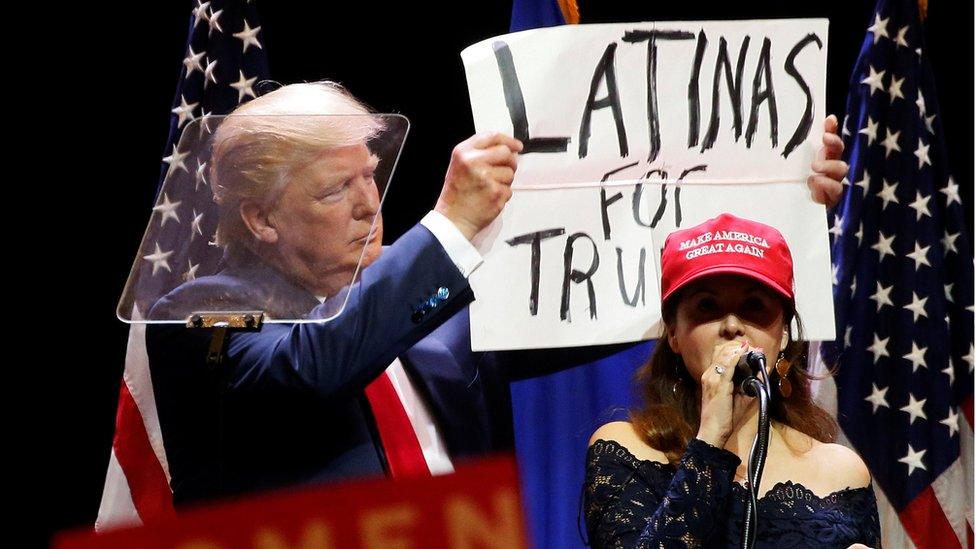US election 2016: Trump and Clinton target Florida
- Published
Donald Trump follows a time-honoured electoral tradition in Tampa
Hillary Clinton and Donald Trump have been campaigning in Florida, a key battleground state that could tip Tuesday's US presidential election.
Florida is the largest swing state and is seen as a must-win for Mr Trump.
The Republican candidate later flew to North Carolina and will then head west to Nevada.
Opinion polls in recent days have suggested Mr Trump is gaining support but he still remains behind Mrs Clinton in most surveys.
In Florida, the contest appears to be tight. Real Clear Politics' poll average, external puts the Democratic candidate ahead, but poll analysis website FiveThirtyEight, external says Mr Trump has a 52.6% chance of winning the state.
US President Barack Obama won Florida in 2012 by a margin of just 0.9% over Republican Mitt Romney.
Candidates need 270 electoral college votes to win the presidency. Florida is worth 29.
Some 37 million early voters have already cast their ballots. Reports suggest many more Latino voters are turning out early in key states including Florida, Arizona and Nevada compared to past elections.
Beyonce and Jay Z turn out for Hillary Clinton
Florida has a significant Latino population, including many Cubans.
Mr Trump told a rally in Tampa: "I say to the Hispanic community living in the inner city, to the African-American community, I say: what the hell do you have to lose?"
He said Cubans supported him. He said he would provide jobs and solve crime for inner-city communities.
Mrs Clinton courted voters in a Haitian-American district of Miami before holding a rally in Pembroke Pines. Her short address there ended in a downpour of rain.
She will later make an appearance in Philadelphia, Pennsylvania, alongside pop star Katy Perry.

Florida's Latino vote

Some Latinos support Trump, despite his harsh rhetoric targeting immigrants
Hispanics make up 16% of registered voters in Florida this election, the Associated Press reports, up from 13.5% in 2012.
American Hispanics mostly vote Democrat but Florida's large Cuban population - which make up 31% of the state's Hispanic vote - have traditionally voted Republican.
Donald Trump recently began to speak out against the US lifting its economic embargo on Cuba in a play for older voters, analysts say.
But they also point out that as more younger Cubans have settled in Miami, support for warming US-Cuba relations - which Mrs Clinton backs - is growing among the community. Polls now suggest that more Miami Cubans are against the embargo than for it.
Mr Trump's divisive and insulting comments about immigrants from Mexico and elsewhere have also angered many Latinos.

Both candidates held rallies in Ohio and Pennsylvania on Friday.
In Cleveland, Mrs Clinton ended the day's campaigning at a concert, where she was joined by the singer Beyonce and her husband, rapper Jay Z.
The Clinton campaign is putting on several events with high-profile figures from the entertainment world as it tries to energise young and minority voters.
Voters describe what's the worst that could happen if the other side wins.
Rocker Jon Bon Jovi will later appear with Democratic vice-presidential candidate Tim Kaine in St Petersburg, Florida.
On Friday night, Mr Trump told supporters in Hershey, Pennsylvania, that he "didn't have to bring J-Lo or Jay Z" to draw crowds.
"I am here all by myself. Just me. No guitar, no piano, no nothing," he said.

In other campaign developments:
Documents alleging to show that Mr Trump's wife, Melania, worked illegally as a model in the US for a brief period two decades ago before she obtained the legal right to work have been obtained by the Associated Press.
The National Enquirer, a US tabloid, paid $150,000 (£120,000) to a former Playboy model for exclusive rights to the story of an alleged affair she had with Donald Trump from 2006-2007, the Wall Street Journal reports. But the Enquirer, which supports Mr Trump, then killed the story, it says. The National Enquirer has denied paying to suppress the story and the Trump campaign says the alleged affair did not occur.
Democratic campaign chief John Podesta said Mr Trump should ask the governor of New Jersey, Chris Christie, to step down as the head of his transition team after two of his aides were found guilty of orchestrating traffic jams in New Jersey as an act of political retribution against a local Democratic mayor. Mr Christie has denied any involvement.

Mrs Clinton has faced a torrent of negative headlines after the FBI said last week it was looking into emails that may be connected to her use of a private email server while she was secretary of state.
The Clinton camp have questioned the timing of the announcement.
Two senior Democrats have now called for an investigation into the role of former New York mayor Rudy Giuliani, a Trump surrogate, after he appeared to suggest he knew about the inquiry before it was announced.
Separately, US authorities have said they are assessing the credibility of information on a possible al-Qaeda extremist attack before election day.
New York City, Texas and Virginia were said to be possible targets but a police spokesman said the information "lacks specificity".
Officials say they regularly assess all possible threats before major events.

Predict the president


